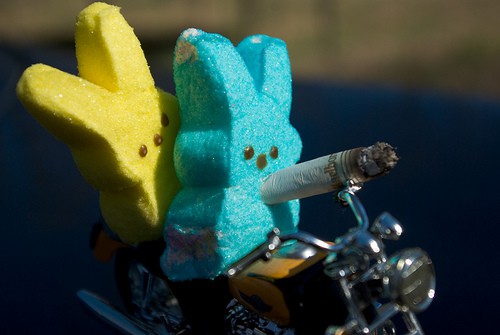Why are bad habits so hard to break? What if the bumper sticker “Just Say No” is actually working against us? If willpower alone were the answer to breaking bad habits, we wouldn’t have drug addiction. There’s something going on in our brains when we lose self-control, but all hope is not lost.
Nora Volkow, head of the National Institute on Drug Abuse, asserts that the phrase “Just Say No!” is in fact “magical thinking.”
Dopamine is one of the main chemicals regulating the pleasure center of the brain. At the most basic level, it regulates motivation and sends signals to receptors in the brain saying, “This feels good!”
Whether you’re a heroin addict seeing someone you associate with using, a caffeine addict smelling coffee brewing, a smartphone addict hearing a phone ding, or hungry watching a mouth-watering food commercial, your brain rushes with dopamine.
One fascinating thing Volkow determined is that images alone can impact the rise of dopamine in our brains. So if we pass a McDonald’s and see the arches, our brain associates that with a tasty hamburger (for some) and shoots up dopamine. That good feeling from the dopamine unconsciously drives the motivation to stop in for a Big Mac. It’s a conditioned response. The same scenario can be applied for to any bad habit you may have.
READ Help Your Brain and Memory by Growing These Magic Plants in Your Garden
What can we do?
It makes sense why many addiction centers are integrating mindfulness into their curriculum. Mindfulness practice has been shown to activate the prefrontal cortex and cool down the amygdala. This gives us the ability to widen the space between stimulus and response where choice lies, then to access possibilities and opportunities we didn’t know were there before. This is crucial when it comes to our addictive behaviors; the ability to take a step back, “think through the drink,” and recognize the various options that lie before us.
We can learn to step into this powerful pause, notice the sensation of the urge, and as the late Alan Marlatt, Ph.D. said, “surf the urge” as it peaks, crests, and falls back down like a wave in the ocean.
One place to start is to just get curious about the pull you feel to whatever you feel compulsive about. An easy one (besides some of the arguably more destructive habits like drugs or alcohol) is our phones.
Today, be on the lookout for what cues you to check your phone. Do you see someone else doing it? Are you waiting and feel uncomfortable about waiting? Is it a certain time of day or place?
Training your brain to recognize this cue can help you get some space from it to ask, “What do I really want to pay attention to right now? What matters?” As we get better at recognizing that space between stimulus and response and making the choices that run alongside our values, like riding a bike, it will start to come more naturally.
READ ALSO What Happens To Our Brain When We Experience Complete Silence & Peace of Mind
Just because our brains have been altered by our compulsive behaviors, doesn’t mean we’re destined to fall into the same habits. With the right skills, community, and support we can learn how to break out of a bad routine and into a life worth living.
As always, please share your thoughts, stories, and questions below. Your interaction creates a living wisdom for us all to benefit from.
by Elisha Goldstein, Ph.D.; PsychCentral

